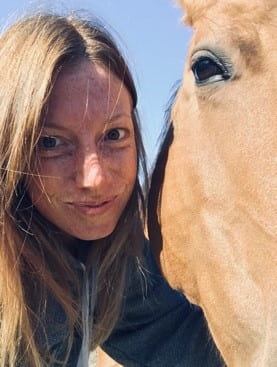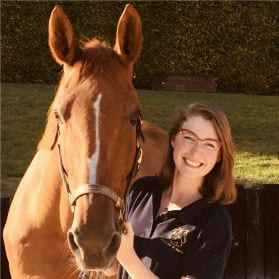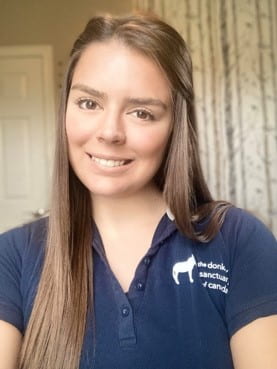| Time Slot | Topic | Speaker | Description of Program |
| 09:00-9:45 | The Horse’s Digestive System |  Nicole Weidner BSc, MSc, PhD Cand. Department of Biomedical Sciences, Ontario Veterinary College, University of Guelph and Equine Guelph, Canada | This talk will take you on a journey through the horse’s digestive system using Equine Guelph’s life size model. The parts have been cleverly designed to mimic the actual size found in the horse, but those with weak stomachs need not worry as the guts aren’t real. We’ll learn about what makes the horse’s digestive system unique and how nutrition and management can keep a horse’s digestive system healthy and happy. |
| 09:45-10:30 | The Hindgut Microbiome |  Dr. Wendy Pearson BSc, MSc, PhD Assistant Professor Department of Animal Biosciences, University of Guelph, Canada | Horse owners are increasingly interested in the horse’s hindgut microbiome and the use of products purported to promote gut health (e.g. prebiotics and probiotics). This talk will help participants understand some of the current knowledge in this area, the difference between prebiotics and probiotics, and what to consider when evaluating a product. |
| 10:30-11:00 | BREAK |
| 11:00-11:45 | Horse Hay Evaluation |  Dr. Paul Sharpe BSc, B.Sc.Agr., MSc, PhD Lecturer Algonquin College of Applied Arts and Technology, Canada | This session will cover horse hay evaluation. Participants will learn to distinguish between grass and legume and estimate relative percentages of grass and legume in a hay sample, and learn about the changes in physical form and nutritional content as forage plants mature. Participants will also learn how to describe and score hay samples in terms of their: maturity (stage of harvest), leafiness, colour (indicating weather and sun damage), odour, softness, and freedom from impurities. |
| 11:45-12:30 | Equine Assessment |  Dr. Wendy Pearson BSc, MSc, PhD Assistant Professor Department of Animal Biosciences, University of Guelph, Canada | Knowing how to assess a horse can help caregivers make a more informed decision about an appropriate feeding plan for the horse. By assessing the horse first, you can determine if your current feeding plans are working, whether your feeding plans need to change, and if so, in what ways they need to change. This talk will introduce participants to the tools/systems that are available to assess a horse. |
| 12:30-1:30 | BREAK |
| 1:30-2:15 | Critically evaluating nutritional supplements for horses |  Dr. Marie-Céline Hottat DVM, Res. ECVCN Faculty of Veterinary Medicine, Ghent University, Belgium | Many horse owners are interested in the use of nutritional supplements for their horses, and there are many different nutritional supplements available. This talk will help participants understand how to critically evaluate these supplements. With this knowledge, we can make a more informed decision when looking at or choosing a nutritional supplement. |
| 2:15-3:00 | Mycotoxins in Horse Feed |  Dr. Younes Chorfi DVM, MSc, PhD Associate Professor, Department of Veterinary Biomedicine, Faculty of Veterinary Medicine, Université de Montréal, Canada | Horse feed is frequently contaminated with various mycotoxins produced by the secondary metabolism of diverse fungal contaminants. As a non-ruminant monogastric, horse may be more sensitive to the detrimental effects of mycotoxins. Contaminated hay, silage or grain and their byproducts impact horse health and immune system and may affect mare reproductive performances. |
| 3:00-3:30 | BREAK |
| 3:30-4:15 | Donkey Assessment and Nutrition Tips |  Kayla Johnson Donkey Welfare & Education Manager The Donkey Sanctuary, Canada www.thedonkeysanctuary.ca | Donkeys have historically been mistaken as ‘horses with long ears’ when in fact, they have many unique aspects of basic care, not the least of which includes nutrition. This presentation seeks to provide an overview of physiological and pharmacological adaptations that make them well-suited for the digestion of fibrous forage and also more sensitive to the energy-dense feeds that many horses are accustom to. We will address the resulting impact to the welfare of donkeys and donkey hybrids living in temperate regions to which they are not well-suited for, especially when care-providers are unaware of their special dietary needs. |


